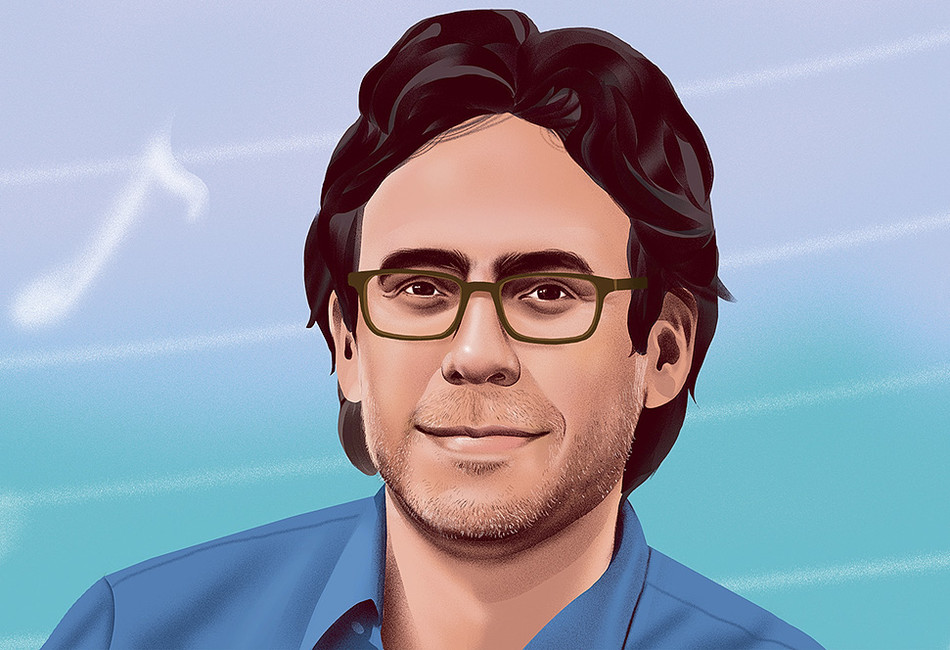In Time’s Echo, Boston Globe classical-music critic Jeremy Eichler ’15GSAS highlights compositions by Strauss, Schoenberg, Britten, and Shostakovich to explore the myriad connections between music and memory.
Why, among all the arts, is music so connected to memory?
Jeremy Eichler: First, of course, music triggers what Proust called “involuntary memory” — a song pops up on the car radio and we’re instantly transported back to high school. But with classical music there is also a creator putting notes on paper and an interpreter pulling those notes off the page. A composer can distill worlds of thought and experience, and then two hundred years later someone standing twenty feet away turns that score into music that resonates in our bodies, and the past is quite literally speaking in the present.
Your book focuses on artistic responses to the Second World War and the Holocaust. Why explore music from nearly eighty years ago?
Sadly, we will soon no longer have a living link to that time through the generation that endured those horrors and can tell their own stories. I wanted to explore how music might provide other routes to know the past — not just intellectually but also viscerally.
Music can bring the past out of what one writer called “the cold storage of history.” It’s true more information about the past is easily available now. We can sit in our pajamas on the sofa and surf the contents of the Cairo Genizah or tour the ruins of Pompeii. But that yields information, not knowledge.
You advocate for what you call “deep listening.” When is listening deep?
When a listener brings an active sense of music as an echo of past time, as culture’s memory. When a listener acts not as a passive receptacle for sounds to wash over but as someone ready to receive messages from the past that might otherwise be whispered into the void. The book explores the reciprocal enchantment of music and history.
The history here includes the tragic collapse of the hopes of the German Enlightenment, which was in many ways a German–Jewish co-creation. How do you help the reader feel the severity of this rupture?
Unlike an academic monograph, a work of nonfiction for the general public can move the argument forward through the prism of true stories. So I tell of an oak tree thought to be beloved to the poet Goethe as he wrote and thought. A century later, in the Nazi era, that oak stood within the walls of Buchenwald concentration camp. Ironically, in the same camp, prisoners were made to replicate the writing desk of Friedrich Schiller, author of the “Ode to Joy,” the quintessential humanist paean set to music by Beethoven. And then when Allied bombs destroyed Goethe’s oak, a prisoner smuggled a fragment back to the barracks and carved a sculpture resembling a death mask, titled The Last Face, considered one of the first Holocaust memorials. Those are details I hope a reader can latch on to.
That story shows the resilience of the humanistic ideas that the Nazis tried to crush.
Absolutely. The critic Walter Benjamin spoke of “fanning the spark of hope in the past,” in ideas that are no less valid for not having succeeded. And so the book also looks at the embodiment in music of iddeals that got buried in the rubble of history.
A prime example is the German concept of Bildung, roughly translated as “personal ennoblement through humanistic education.” In this worldview, the arts were seen not as merely decorative (today, classical music is often presented for “relaxation”) but as forces that can work a change in us, creating a different kind of awareness, a life of aesthetic grace, a sense of empathy.
What change would you like Time’s Echo to achieve?
I hope it opens up avenues for readers to arrive at a more textured, richly felt connection to the past so that they can see how music helps us feel that worlds that came before are organically connected to us and have led to the world we live in today. I want readers to understand that we can respond not only to the immense tragedies of the era but also to the incredible idealism in the preceding world that those tragedies destroyed. Through these travels in history we can access moments of hope that might just give us tools for thinking about our future.
This article appears in the Fall 2023 print edition of Columbia Magazine with the title "Music as Time Travel."



